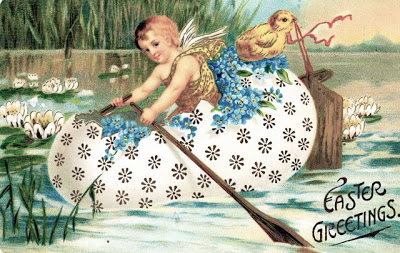
Front of Easter postcard from Josef to Lisi. Note Cupid appears to be rowing an eggshell boat filled with flowers and a chick guides the rudder.
March 31, 1911,
Cleveland Ohio
Addressed To:
F[räulein] Elise Ebner
Hermannstadt [Sibiu today]
Reispergasse No. 2 [the street address]
Europe Hungary
In 1911, Easter was on April 16th, so Josef made sure that his Easter postcard to Lisi would arrive in time by mailing it April 1st (postmark). I decided posting it closer to Easter 2011, rather than on the date it was written, was more in keeping with the spirit of this holiday. It also gives me the chance to share with you a funny—and typically youthful—tradition that kept Siebenbürgen girls pretty wet on Easter.
Here’s the message my grandfather, Josef, wrote to his sweetheart, later my grandmother, Lisi (also Elise—both nicknames for Elisabetha), and below the explanation of its confusing content:
Dear Lisi,
I share with you that I have thankfully received your wonderful letter. I wish you a happy Easter. I am making a good many red eggs because I’m coming to spray you.
So long. Adieu
When I first read this message, in German, I was thoroughly perplexed. At first I thought Josef meant that he was “spraying water on eggs,” deducing it was an idiom for dying the eggs. So of course I turned to my deciphering buddy, Meta. She filled me in, and then, more recently, her daughter, Ingrid, gave me this detailed explanation of the tradition of “spraying” girls on Easter (translated from the German):
“On the first day of Easter celebration, it was tradition that the young men went to the young ladies in order to “spray” (begiessen) them, as your grandfather writes. Each young man had a little bottle with perfume and asked if he may spray the girl (“May I have permission to spray you?”). Then the girls had to say “yes.” The boy spritzed the girl on her hair. It wasn’t only a girl’s boyfriend who did this. All the young men in the village could go to any girl. When they had sprayed the girl, they received a colored egg from the her (the favorite was a red egg) or some sort of liquor / liqueur to drink. Sometimes it was Schnaps. It was always fun. At the end of the day, most of the young men felt sick because of all the alcohol! The girls counted the young men who had come to spray them, because it showed which girls were the favorites. Because the men used all different sorts of perfume, the girls hair smelled pretty bad by evening time. But… it was the tradition.
“The little boys—children, also went to the little girls, but they received only eggs and sometimes candy too. At the end of the day they were very proud to have collected many eggs. Even older men had little perfume bottles with them. But they didn’t go to every house. They sprayed only the women in their families.
“Sometimes (not often) the young men played a prank—and after the normal spritzing, they also had a big bottle with soda water, and without asking, as a surprise, they doused a girl. She was soaking wet and had to go home and change into dry clothes!”
It was a rather soggy version of the “dance card.” The more sprays a girl got, the more popular she was. But as boys will be boys, across the centuries, things could get out of hand so that even a simple “spritz” could become a deluge.
Soon to come: Josef pulls out all the stops to get his best girl, sprayed or not, to join him in America.

What fascinating fun, though I can’t say I’m sorry that the custom didn’t catch on in the U.S.
Fun, this weekend any girl could get sprayed by stepping out her door in Evanston. How nice to thing of spring traditions, even if the weather isn’t sunny.
Sounds to me like that might have been the start of the “Wet Tee Shirt Contest”… a tradition carried on at Spring Break to this day. Who would have thought it started in Siebenbürgen.
This sounds quite mammalian–marking your territory–to me. In contrast, the fact that this tradition is so tied to its time and place affords us the thrill of time travel. Thanks for the memory.
Quite an array of creative reponses to this post. We have Marking territory per Adrienne, wet t-shirt contest — only a guy would have come up with that, Bob, local weather comparisons, and gratitude that we don’t spray around here. Enter the super-soaker! With that device a guy could mark his territory and get wet t-shirts from a distance! Thanks to all for commenting.